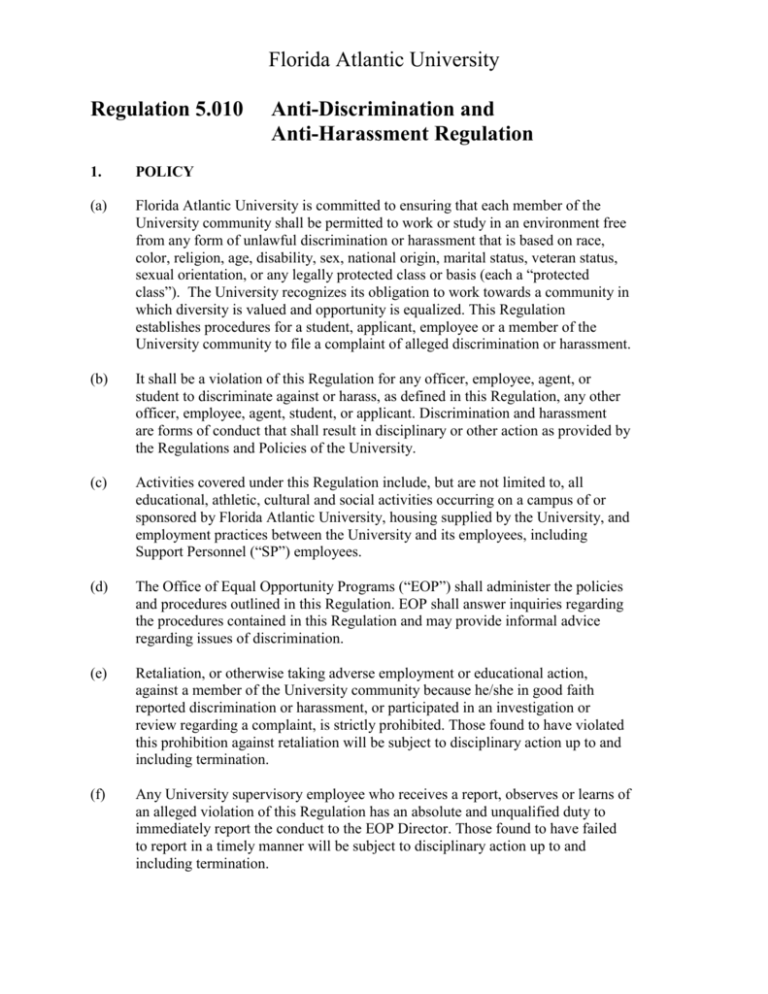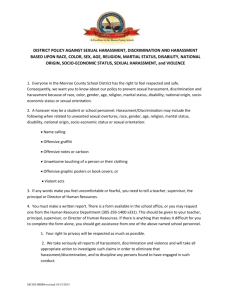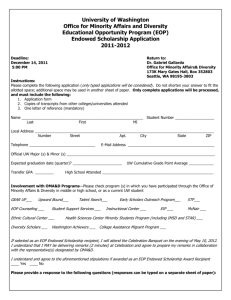
Florida Atlantic University
Regulation 5.010
Anti-Discrimination and
Anti-Harassment Regulation
1.
POLICY
(a)
Florida Atlantic University is committed to ensuring that each member of the
University community shall be permitted to work or study in an environment free
from any form of unlawful discrimination or harassment that is based on race,
color, religion, age, disability, sex, national origin, marital status, veteran status,
sexual orientation, or any legally protected class or basis (each a “protected
class”). The University recognizes its obligation to work towards a community in
which diversity is valued and opportunity is equalized. This Regulation
establishes procedures for a student, applicant, employee or a member of the
University community to file a complaint of alleged discrimination or harassment.
(b)
It shall be a violation of this Regulation for any officer, employee, agent, or
student to discriminate against or harass, as defined in this Regulation, any other
officer, employee, agent, student, or applicant. Discrimination and harassment
are forms of conduct that shall result in disciplinary or other action as provided by
the Regulations and Policies of the University.
(c)
Activities covered under this Regulation include, but are not limited to, all
educational, athletic, cultural and social activities occurring on a campus of or
sponsored by Florida Atlantic University, housing supplied by the University, and
employment practices between the University and its employees, including
Support Personnel (“SP”) employees.
(d)
The Office of Equal Opportunity Programs (“EOP”) shall administer the policies
and procedures outlined in this Regulation. EOP shall answer inquiries regarding
the procedures contained in this Regulation and may provide informal advice
regarding issues of discrimination.
(e)
Retaliation, or otherwise taking adverse employment or educational action,
against a member of the University community because he/she in good faith
reported discrimination or harassment, or participated in an investigation or
review regarding a complaint, is strictly prohibited. Those found to have violated
this prohibition against retaliation will be subject to disciplinary action up to and
including termination.
(f)
Any University supervisory employee who receives a report, observes or learns of
an alleged violation of this Regulation has an absolute and unqualified duty to
immediately report the conduct to the EOP Director. Those found to have failed
to report in a timely manner will be subject to disciplinary action up to and
including termination.
(g)
Every University employee has a duty to cooperate fully and unconditionally in a
harassment investigation. This duty includes, among other things, speaking with
the EOP investigator and voluntarily providing all documentation which relate to
the claim being investigated. The failure and/or refusal of any employee to
cooperate in an investigation may result in disciplinary action up to and including
termination.
(h)
The prohibited conduct contained in this Regulation shall apply to vendors and
contractors of the University. The EOP Director shall consult with the vendor or
contract manager to determine how any investigation will be undertaken. The
University shall take action against the vendor or contractor, when warranted, in
accordance with the terms of the governing contract or agreement.
2.
DEFINITIONS/EXAMPLES
(a)
For the purpose of this Regulation, discrimination is defined as unlawfully
treating any member of the University community differently than similarly
situated others based on a protected class herein. Harassment is a form of
unlawful discrimination based on a protected class that may also be covered under
Title VII of the Civil Rights Act of 1964, the Florida Civil Rights Act and other
laws.
(b)
Additionally, discrimination on the basis of sex in education programs and
activities receiving federal financial funding as set forth in Title IX of the
Education Amendments of 1972, as amended (“Title IX”), is included in this
Regulation’s definition of prohibited discrimination.
(c)
For the purposes of this Regulation, examples of conduct that fall into the definition of
discrimination include, but are not limited to:
(d)
1.
Disparity of treatment in recruitment, hiring, training, promotion, transfer,
reassignment, termination, salary and other economic benefits, and all
other terms and conditions of employment on the basis of membership in a
protected class herein.
2.
Disparity of treatment in educational programs and related support
services on the basis of membership in a protected class herein.
3.
Limitation in access to housing, or of participation in athletic, social,
cultural or other activities of the University because of membership in a
protected class herein, and not based on a bona fide requirement or
distinction.
4.
Retaliation for asserting protected anti-discrimination rights, filing
complaints or protesting practices which are prohibited under this
Regulation.
For the purposes of this Regulation, examples of conduct that fall into the
definition of harassment include, but are not limited to:
(e)
1.
Verbal and/or physical conduct based on a protected characteristic that:
(A) has the purpose or effect of creating an objectively intimidating,
hostile or offensive work or educational environment; (B) has the purpose
or effect of unreasonably interfering with an individual’s work or learning
performance; or (C) otherwise unreasonably adversely affects an
individual’s employment or educational opportunities.
2.
Examples of the foregoing verbal and/or physical conduct that may
constitute harassment could include making “jokes” based on a protected
characteristic, objectionable epithets/slurs, threatened or actual physical
harm or abuse, the display of hostile symbols/objects, and other
intimidating or insulting conduct directed against the individual because of
their protected characteristic or membership.
Sexual harassment, which includes acts of sexual violence and may include
gender-based harassment, is a form of discrimination on the basis of sex and is
prohibited by Title IX.
1.
2.
Sexual harassment is unwelcome conduct of a sexual nature. It includes
unwelcome sexual advances, requests for sexual favors, and other verbal,
nonverbal, or physical conduct of a sexual nature when:
a.
Submission to such conduct or request is made either explicitly or
implicitly a term or condition of an individual's employment;
b.
Submission to such conduct or request is made either explicitly or
implicitly a term or condition of academic achievement;
c.
Submission to or rejection of such conduct or request by an
individual is used as the basis for an employment or academic
decision affecting such individual; or
d.
Such conduct or request unreasonably interferes with an
individual's work or academic performance or creates an
objectively intimidating, hostile, or offensive environment for
working or learning.
Examples of unwelcome conduct of a sexual nature that may constitute
sexual harassment under this regulation include, but are not limited to:
a.
b.
c.
d.
e.
Displaying or telling sexually oriented jokes, statements,
photographs, drawings, computer images, web sites, videos, slides,
graphics, calendars, cartoons, e-mails or other communications.
Making sexually explicit or suggestive gestures or sounds.
Making actual or implied promises of an employment or
educational opportunity or benefit in exchange for sexual activity.
Making actual or implied threats to impede or interfere with
employment or educational opportunities or benefits for failing to
agree to or engage in sexual activity.
Inappropriate and unwelcome sexual attention or touching,
including but not limited to leering, patting, fondling, pinching,
f.
g.
h.
sexually-based stalking and/or bullying, and attempted or actual
kissing.
Requesting or coercing sexual intercourse or sexual favors, or
attempting to or actually engaging in a sexual assault.
Continuing to ask someone for a date after repeatedly being told
“no.”
Continuing any of the conduct listed in the above examples after
being told or being otherwise made aware that the conduct is
unwelcome.
3.
Sexual Violence is a form of sexual harassment and is prohibited under
Title IX. Sexual violence includes physical sexual acts perpetrated against
a person’s will or where a person is incapable of giving consent due to an
intellectual or other disability or the victim’s use of or exposure to drugs
or alcohol. Acts falling into the category of sexual violence include, but
are not limited to, rape, sexual assault, sexual battery, and sexual coercion.
4.
Gender-based harassment may be a form of sexual harassment prohibited
under Title IX. Gender-based harassment includes acts of verbal,
nonverbal or physical aggression, intimidation, or hostility based on sex or
sex-stereotyping, even if those acts do not involve conduct of a sexual
nature.
(f)
The definition of sexual harassment excludes the use of sexual material in a
classroom setting for academic purposes.
(g)
When referred to in this Regulation, “days” means calendar days unless otherwise
noted.
(h)
Disparate treatment on the basis of a class not protected by federal or state law
shall not constitute discrimination or harassment if such disparate treatment is
required by federal or state law.
3.
PROCEDURE FOR REPORTING VIOLATIONS
(a)
The Office of Equal Opportunity Programs is responsible for administering the
complaint and investigation process set forth in this Regulation. In cases where
the potential complainant chooses not to file a formal complaint, EOP will take
action to inform the alleged offender of the concerns, suggesting that the
individual monitor and modify (if necessary) his/her behavior. All complaints,
formal or informal, must be reported to EOP. The EOP contact information is
provided below:
Director Equal Opportunity Programs
Florida Atlantic University
Administration Building
777 Glades Road, Room 265
Boca Raton, Florida 33431-0991
http://www.fau.edu/eop/
(561) 297-3004
The EOP Director is the Title IX Coordinator for the University.
(b)
Any University employee who believes he/she has been harassed or discriminated
against in violation of this Regulation must report the facts and circumstances
thereof to the EOP Director, the University Provost, the Director of Human
Resources, or to his/her College Dean or Vice President, who in turn must notify
the EOP Director.
(c)
Any student who believes he/she has been harassed or discriminated against in
violation of this Regulation must report the facts and circumstances thereof to the
EOP Director, the University Ombudsman, the University Provost, the Dean of
Students, or to his/her Department Head/Director or College Dean, who in turn
must notify the EOP Director.
(d)
Reports or allegations of an alleged violation of this Regulation will be processed
upon the filing of a written complaint with EOP. The Director of EOP may
process an alleged violation without a written complaint if deemed necessary by
the Director and enough information is available to conduct a responsible
investigation.
(e)
A complaint must be filed with EOP within one-hundred eighty (180) days of the
alleged act(s) of discrimination/harassment. The Director of EOP may process an
alleged violation outside of this time limitation if deemed necessary by the
Director. The filing of a complaint under this Regulation is independent and does
not preclude the complainant from also filing a complaint with federal, state or
local enforcement agencies. The filing of a complaint with EOP does not
constitute a filing with, or have any effect on the filing time limitations of those
external agencies. All complainants are urged to contact these external agencies
directly to learn the filing deadlines and procedures for each agency. Contact
information for these agencies is available from the EOP office.
(f)
All complaints shall contain the name of the complainant and state the nature of
the act(s) complained of, including such details as the name of the alleged
offender and the date(s) or approximate date(s) on which the offending act(s)
occurred, the name(s) of any witnesses, and the desired resolution(s). Any
portion of a complaint file that is exempt from public disclosure under the Florida
Public Records law shall remain confidential to the extent permitted by law.
4. PROCEDURE FOR INVESTIGATION OF COMPLAINTS
(a)
EOP shall investigate all complaints that contain enough information to allege
prohibited discrimination or harassment. This investigation must include, but
shall not be limited to, interviewing the alleged offender and the complainant.
Each party shall have an equal opportunity to present relevant witnesses and other
evidence. The investigation may include the interview of other persons who may
have information relevant to the allegations, preparation of witness statements for
all persons interviewed, and review of any relevant documents. Upon completion
of the investigation, a final report shall be prepared which includes a summary of
the complaint, a description of the investigation, whether a violation of University
Regulation was found, based on a preponderance of the evidence, and
recommendations for disposition.
(b)
The Office of Equal Opportunity Programs may attempt conciliation before or
during the course of an investigation of a complaint. If conciliation is not
achieved, then EOP shall continue to investigate the complaint, and shall issue a
final report.
(c)
EOP shall conclude its investigation and issue its final report within seventy-five
(75) days of the filing of the complaint. If additional time is required, the
complainant and alleged offender will be notified in writing no less than ten (10)
days prior to the seventy-five (75) day deadline of the reason(s) for the delay and
the expected date of completion.
(d)
The final report by EOP shall be submitted to the appropriate Vice President or
Associate Provost if an employee is involved, and/or to the Dean of Students if a
student is involved. The alleged offender and complainant will each be notified in
writing of the outcome of the complaint and any appeal. Corrective or
disciplinary action up to and including dismissal or expulsion will be considered
and implemented, if warranted, by the Vice President, Provost or Dean of
Students in consultation with the EOP Director. Corrective or disciplinary action
will also be considered and implemented if EOP determined the complaint was
unfounded and made maliciously or recklessly. All disciplinary action shall be
subject to applicable University Regulations (including but not limited to
University Regulation 5.009 (Grievance Procedure) and University Regulation
4.007 (Student Code of Conduct)), policies and applicable collective bargaining
agreements.
5.
PROCEDURE FOR RECONSIDERATION
(a)
Any party may submit a written response or statement to be attached to the EOP
final report and maintained in the same file.
Either the complainant or alleged offender may request reconsideration of the
finding in the EOP final report. The party must submit this request in writing to
the EOP Director within ten (10) days of receipt of the EOP final report.
(b)
(c)
The request for reconsideration must be in writing and shall specify the basis of
the request. Typically, reconsideration will be granted only in cases where
relevant evidence was not reviewed and/or new evidence is available.
Specific Authority: Article IX of the Florida Constitution; Florida Board of Governors
Regulation 1.001; Formerly 6C5-5.012, Amended 11-11-87, 7-5-99, 11-9-05, 6-28-06,
11-16-11.
To download a copy of the Discrimination/Harassment Complaint Processing
Form click here.




![[school/department/work unit] EOP](http://s3.studylib.net/store/data/007019024_1-9182da65872ec3349f5f8dad4e6a3909-300x300.png)




